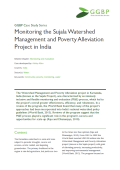This case study explores the decision-making process that led up to the design of Belize’s first integrated coastal zone management plan, officially approved by the government in August 2016. It involves ecosystem service modeling, stakeholder participation, and spatial planning, and it assesses risk to three coastal-marine habitats posed by eight human uses. The study quantifies current and future delivery of three ecosystem services: protection from storms, catch and revenue from lobster fishing, and tourism expenditures to identify a preferred zoning scheme.
The study finds that a highly adaptive team of planners, scientists, and analysts can overcome common planning obstacles, including a dearth of data describing the health of the coastal zone and the many uses it supports, complicated legal and political landscapes, and limited in-country technical capacity. This work in Belize serves as an example for how to use science about the ways in which nature benefits people to effectively and transparently inform coastal and ocean planning decisions around the world.


